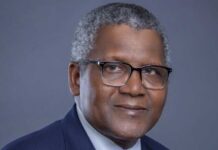.As UN allocates $20m to strengthen food security in Nigeria
.Eko rice hits market, as Sanwo-Olu launches N5bn forward contracts for paddy supplies
Commodities Exchange lists, trades rice at N33,000 per 50kg bag
IBRAHIM QUADRI with agency report
World leaders attending a summit in Paris Thursday must ensure that wealthier nations commit to comprehensive debt relief for lower-income nations, including the cancellation of loans and to the scaling up of international assistance to vulnerable states, Amnesty International, AI said yesterday.
AI also called on the Summit for a New Global Financing Pact (PACT) to ensure wealthier nations honour previous financial pledges they have failed to meet and adopt new ones which guarantee the rights of people in lower-income countries.
PACT is a two-day event, called last year by France’s President Macron. It is holding in Paris from 22-23 June while more than 50 heads of state or government including President Bola Ahmed Tinubu are expected to attend.
The meeting was inspired by the Bridgetown Initiative, a framework agreed in 2022 in Barbados to reform the global financial system and address the debt, climate, and cost-of-living crises.
The rights to an adequate standard of living and to social security are enshrined in the 1948 Universal Declaration of Human Rights, as well as the International Covenant on Economic, Social and Cultural Rights, which has been ratified by more than 170 countries. Article 2 of the ICESCR obliges states to take steps, including through international cooperation and assistance, to support other states to meet their economic and social rights obligations.
“Many vulnerable, lower-income states have been overwhelmed by economic shocks, debts they cannot pay, and the effects of climate change – a crisis to which they contributed very little, but which is costing people in these countries dearly. These are unprecedented challenges that require a rethink of how the world’s financial architecture is set up,” said Agnès Callamard, Amnesty International’s Secretary General.
“The rights of many people in vulnerable countries to access healthcare and social protection are not met at even the most basic level. There is a vital need to provide financial and technical assistance to these countries so that they can scale up social protection schemes to guarantee people’s right to an adequate standard of living.
“Unsustainable levels of debt can have grave implications for economic and social rights. The cost of servicing existing debt can divert essential financing away from crucial social spending. Coordinated international action offering debt relief can transform the ability of governments to invest in economic and social protections, supporting their capacity to protect the rights of their people.
“All creditors – states, private creditors, and international financial institutions – should cooperate to ensure timely debt relief for all countries in and at risk of debt distress and consider all options, including debt restructuring and debt cancellation.
“All states should support and fund the establishment of a global social protection fund to help countries that are struggling to provide adequate protections, as advocated by the International Labour Organization and UN Special Rapporteur on Extreme Poverty and Human Rights.
“It is regrettable that many states, and civil society organizations and social movements representing communities worst affected by these crises, will not be represented at the summit. Those most exposed to the effects of climate change and national indebtedness should be allowed to contribute to discussions and engage in reforms that can achieve climate justice and economic security.
“Whether the Paris meeting, called by France’s President Macron outside of the usual UN framework for discussions, is an appropriate forum for the substantial reforms required is questionable.
“Nonetheless, we urge the summit’s participants to recognize the urgency of this unfolding crisis and encourage them to harness the growing momentum for change. It is crucial that they enable further progress at the G20 Leaders’ Summit and COP28 climate meeting later this year.”
Lower income countries cannot fairly phase out fossil fuels, protect people from the harms of the climate crisis and provide remedy to those most affected if wealthier states continue to evade their obligations of international cooperation and assistance under human rights law and the commitments taken under the 2015 Paris Agreement and the United Nations Framework Convention on Climate Change to provide climate finance to developing countries.
Countries have failed to fulfil a pledge to provide US$100 billion annually to help states mitigate and adapt to climate change. A separate loss and damage fund has yet to be funded and become operational. A climate meeting in Bonn this month was hampered by disputes between wealthy and developing countries over climate finance.
“Commitments to ensure urgent and sufficient relief for nations in debt distress, and more grants, are required to support those states struggling to protect the rights of people against the devastating impacts of the climate crisis and other disasters,” said Agnès Callamard.
“With average global temperatures rising and set to far exceed the 1.5˚C increase over pre-industrial levels previously agreed to, the world is standing on the precipice of a climate disaster. This summit should offer a chance for global leaders to protect the rights of the world’s most marginalized people, not move the burden further onto those who are suffering the most but contributed the least to causing this crisis.”
The global financial system has failed the people most at risk from an unprecedented combination of crises, and fundamental reform to make it more inclusive, sustainable, and equitable is long overdue.
Amnesty International shares many of the concerns about this summit made by civil society organizations and some Global South countries, including the absence of a scheduled discussion on a UN Tax Convention and Tax Body to create fairer global tax governance, and on the imperative to shift finance away from fossil fuels and towards economic and social rights.
UN allocates $20m to strengthen food security in Nigeria
Meanwhile, the United Nations (UN) has allocated $20 million dollars to urgently ramp up response to the alarming food security and nutrition crisis in the north-east of Nigeria.
UN Deputy Spokesperson Farhan Haq disclosed this at a news conference on Tuesday at UN headquarters in New York.
“With nine million dollars from the Central Emergency Response Fund (CERF) and $11 million from the Nigeria Humanitarian Fund, we will support the Government-led response efforts across Borno, Adamawa and Yobe states.
“Assistance includes […] ready-to-eat food, access to clean water, health care and agriculture support,’’ he said.
According to humanitarian partners, almost 700,000 children under five are likely to suffer from life-threatening severe acute malnutrition this year in this region and more than half a million people may face emergency levels of food insecurity during the lean season from June to August.
Haq said that the emergency funding would help jumpstart the response, but humanitarian partners need more to prevent widespread hunger and malnutrition.
“The $1.3 billion humanitarian response plan for Nigeria is only 26 per cent funded,’’ he said.
Updating journalists on Sudan, the deputy spokesperson said the humanitarian community continued to deliver live saving support to the people.
He said that Tuesday, the Office for the Coordination of Humanitarian Affairs (OCHA) had facilitated the movement of at least 388 trucks carrying life-saving assistance to various parts of the country.
Haq quoting the World Food Programme (WFP) says that the agency has reached more than one million people with emergency food assistance in the six weeks since it resumed operations in Sudan.
“This includes reaching more than 375,000 people in North, South, East and Central Darfur.
“People continue to seek refuge from the fighting in Sudan in neighbouring countries. The UN Refugee Agency (UNHCR) says that more than 500,000 people have now fled across Sudan’s borders to escape the violence.
“You may have seen that, yesterday, donors announced more than 1.5 billion dollars in support of the humanitarian response in Sudan.
“In the region, during the high-level pledging event co-hosted by the UN, together with the Governments of Egypt, Germany, Qatar, Saudi Arabia, the African Union and the European Union,’’ he said.





















